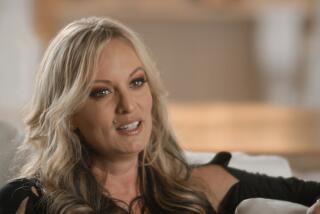Martha Stewart, fall girl
- Share via
“Is Martha Stewart a high-profile fall girl for the real bad boys of Wall Street, or is she getting her just deserts?” asks society diarist Dominick Dunne, looking preternaturally owlish nestled against the chintz and leather of the set of “Power, Privilege and Justice,” his weekly exploration of high-society lowlifes.
In this case, it’s pretty much a rhetorical question. Dunne, who admits to being a “big fan of Martha” as well as a friend, presents a credible case for the former in this installment of the series, which airs on Court TV as Stewart’s trial on obstruction of justice and securities fraud charges gets underway next week.
Dunne, who famously covered the O.J. Simpson trial for Vanity Fair and has made the legal troubles of his society cohorts his specialty, may not be the most impartial interpreter of the forces that squired Stewart to court. But he’s a fitting narrator for what is quickly shaping up to resemble a real-life “Bonfire of the Vanities.”
As painted by Dunne, the portrait that emerges features ambitious prosecutors, faithless friends and a frightened young lackey set against “the glittering world of the rich and the super-rich,” a world that, according to Dunne, “is more dangerous than you can imagine.”
If Dunne comes across as unabashedly pro-Martha -- he fondly recalls spending an evening at her storied estate in Maine, where he was driven to exclaim, “Martha, this is fantastic!” -- his slant is balanced by the unkind characterizations of Stewart’s friends and neighbors, who seize the opportunity to extemporize about Stewart’s shortcomings as a wife, friend and boss.
As Christopher Byron, a former neighbor turned unauthorized biographer, recounts some of the nastier points of the Stewart divorce (Andy Stewart, who left Martha for one of her assistants, is portrayed as the injured party in the marriage), Dunne’s cheerleading starts to feel not only justified but necessary. The case against Stewart -- at least as it is presented here -- feels as though it’s motivated by questionable factors.
“It’s a high-stakes gamble for the government as well,” former United States prosecutor Robert Mintz explains. “They’ve decided to take down one of the most recognizable faces in corporate America today.”
The first half of the show, which chronicles the hard-luck background and astonishing rise of the goddess of the good thing -- from a childhood dominated by a domestic tyrant of a father through stints as a model, stockbroker, caterer and wife -- covers ground familiar to witnesses to the gleeful hatchet job of NBC’s “The Martha Stewart Story.” It also slyly highlights some of the inchoate malice that Stewart seems to inspire in those who know her (or at least those willing to share their thoughts on camera). Alluding to her humble origins, for instance, Hamptons magazine editor R. Court Hay sneers, “You have to remember, basically, that Martha Stewart, you know, wasn’t exactly born in Greenwich.” Meow.
The show’s second half scrutinizes the circuitous, convoluted and potentially precedent-setting case against Stewart, which seems to have the ghost of Kenneth Starr hovering over it. As a necessary primer for what is bound to be a landmark case, “Martha Stewart on Trial” is clear and thorough, explaining the charges against her in detail and raising some troubling questions about federal prosecutors’ motivations for going after Stewart.
“I couldn’t help but think that the feds were taking great pleasure in putting her through this embarrassing ordeal,” says Dunne over footage of Stewart’s arraignment, in which the symbol of WASP perfectionism is seen being ushered through a throng of reporters in the rain.
Stewart, whose sale of about $45,000 worth of ImClone stock shortly before the FDA rejected its application for approval of an experimental drug initially aroused the suspicion of federal prosecutors, has not been charged with insider trading. Instead, she faces up to 30 years in federal prison for allegedly lying to federal prosecutors, obstruction of justice and securities fraud.
The third charge stems from her public airing of her version of events, which, according to prosecutors, was intended to keep the stock price of Martha Stewart Omnimedia from falling. (Sam Waksal, the former chief executive of ImClone who dumped millions in stock, got seven years.) In what could turn out to be a bizarre twist on the Enron, Tyco and Worldcom cases, prosecutors’ success could result in millions of dollars in losses of Martha Stewart Omnimedia stock value, making what has thus far been a relatively victimless alleged crime into a fully victimed one.
As former Merrill Lynch securities analyst Henry Blodget -- who had his own high-cost, high-visibility run-in with securities law authorities -- wrote in the online magazine Slate.com: “The securities fraud charge ... puts Stewart -- and any other executive accused of wrongdoing -- in a no-win situation: Guilty or innocent, the accused cannot risk explaining his or her actions, even for the benefit of investors, for fear of getting slapped with the potentially more serious charge of securities fraud.”
In other words, it would seem that Stewart is being thrown into the pond to see if she’ll float. Not a good thing, but one that, ironically, may finally link her to the Puritan heritage she’s been lambasted so often for faking.
*
‘Martha Stewart on Trial’
What: “Dominick Dunne’s Power, Privilege and Justice: Martha Stewart on Trial”
Where: Court TV
When: Today, 10-11 p.m.
Host...Dominick Dunne
Executive producer, Anthony Horn
More to Read
The complete guide to home viewing
Get Screen Gab for everything about the TV shows and streaming movies everyone’s talking about.
You may occasionally receive promotional content from the Los Angeles Times.






